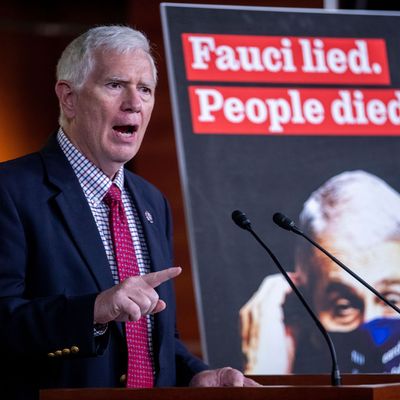
Heading toward the 2022 midterm elections, Republican-watchers are fascinated by the aggressive role Donald Trump intends to play in GOP primaries. Aside from his plans of vengeance toward those who egregiously crossed him at some point over the past half-century, he is selectively backing candidates whom he can claim as his very own. Indeed, the former president has already endorsed ten Senate candidates, two House candidates, and five candidates for state offices (one for a 2021 election). More important, his potential endorsements have Republican candidates and proto-candidates scrambling to prove their MAGA credentials so as to head off, or at least partially neutralize, the possibility that the Boss will give the magic nod to an opponent. The most obvious example of this phenomenon is in the Ohio U.S. Senate race, during which candidates had an Apprentice-style audition with Trump at Mar-a-Lago in March, with one aspirant, J.D. Vance, subsequently launching his candidacy by apologizing for criticisms of the 45th president back in 2016.
But loyalty to Trump isn’t the only essential trait for Republican candidates in a party that (in this century, at least) seems haunted by fears of heresy more than it is tempted by dreams of diversity and outreach. Trumpism has simply been added to previous conservative litmus tests. Revealingly, Herschel Walker — one high-profile potential candidate for the U.S. Senate whom Trump has strongly encouraged to enter the race — is alarming some conservatives in Georgia because he hasn’t been ideologically vetted, as the Atlanta Journal-Constitution reports:
“Herschel Walker will need to come back to Georgia and campaign. He will need to show that he is a conservative,” Doug Collins, a former Republican congressman and 2020 Senate candidate, said on his radio show.
“I have never heard Herschel Walker’s position on pro-life. I haven’t,” Collins said. “I’ve never heard his position on gun control. I’ve never heard his position on a lot of these issues that are conservative issues.”
This demand was significant because Collins himself is a MAGA stalwart, having served as Trump’s chief defender on the House Judiciary Committee during the former president’s first impeachment. But he won’t take Trump’s word for it that Walker is ideologically kosher: The current Republican front-runner for the 2022 Senate nomination needs to publicly pledge his allegiance to culture-war causes like banning abortion and outlawing any outlawing of a single gun.
Certainly, abortion and guns represent two major issues on which any sort of heterodoxy is disqualifying for nearly all Republican candidates. The once-robust pro-choice Republican caucus in Congress is now down to two veteran senators: Susan Collins and Lisa Murkowski. A good indication of how obligatory anti-abortion views have become was provided by recent party-switcher Jeff Van Drew of New Jersey. He had a strongly pro-choice voting record as a Democrat, but one of his first House votes as a Republican was on behalf of a failed effort to force a bill banning all abortions after 20 weeks of pregnancy onto the floor. Similarly, one of the vanishingly few congressional Republicans open to any kind of gun regulation, Senator Pat Toomey, is retiring next year. On both of these cultural issues, Republican opinion seems to be hardening. The ascendant conservative view on reproductive rights is now fetal personhood as a matter of federal constitutional law, rather than simply a reversal of Roe v. Wade, and a return of abortion regulation to the states. And on guns, the big conservative trend is “constitutional carry,” a rejection of any firearms licensing provisions, which is closely associated with the even more dangerous idea that the Second Amendment was designed to give teeth to a “right to revolution” against a “tyrannical” government.
But these are hardly the only litmus tests of “true conservatism” that survived or even flourished in the Trump era. Tax increases remain verboten, as evidenced by their absence from the recent bipartisan infrastructure package in the Senate. Anti-government rhetoric, an inheritance from the Goldwater-to-Reagan conservative movement that was intensified by the tea-party phenomenon of the Obama era, now has even greater power thanks to the Trumpian doctrines of a traitorous deep state and a corrupt Swamp dominating Washington. Hostility to organized labor is now universal in a party that used to more than occasionally secure union endorsements for its candidates (unless you take seriously the eccentric endorsement by Marco Rubio of an effort to organize Amazon workers or the more general revolt against “woke” corporations).
There are obviously some tenets of traditional conservatism that Trump has called into doubt as orthodoxy. Several are really restorations of Old Right thinking: the abandonment of free-trade principles for a return to the protectionist creed that animated Republicans from the Civil War to World War II, an America First repudiation of neoconservative commitments to alliances and interventionism, and a return to the nativism that has always been just under the surface in Republican politics. While Trump’s sometimes incoherent views on these topics haven’t become totally obligatory for Republicans just yet, gestures in his direction probably are required. It’s hard to imagine, for example, more than a smattering of Republicans vocally opposing a border wall, or calling for closer trade relations with China, or saying something nice about NATO, much less the United Nations. In international relations, Trump’s determination to throw money at the Pentagon and his unremitting bellicosity have made his isolationist tendencies more acceptable to the Cold War set.
There’s one very loud new habit of Republicans that Trump has elevated from a fringe extremist preoccupation into a near-universal habit in the GOP: the attacks on “political correctness,” “wokeness,” “cancel culture,” and now “critical race theory” that present a violent antipathy to cultural changes deemed threatening to white patriarchal hegemony (or, stated more neutrally, to the “Great” America Trump has promised to bring back). All these phantom menaces are nicely designed to make old-school racism and sexism respectable.
All in all, it’s a complicated landscape that ambitious Republicans must navigate to safely rise within the Trumpified GOP. The safest are hard-core conservatives of the old school who downplay Reaganite views that are now out of fashion — and who add in conspicuous personal loyalty to Trump and whatever he wants at any given moment. Examples of this formula are Ted Cruz, the members of the House Freedom Caucus, and, above all, Alabama U.S. Senate candidate Mo Brooks, who is still doing penance for endorsing Cruz in 2016, in part by personally participating in Trump’s January 6 insurrectionary rally. Trump is close to the once-unlikely accomplishment of making “true conservatism” and Trumpism identical. The big question is whether his personal presence as a presidential candidate or a hurricane-force disrupter is necessary to seal the deal.






























